This article is going to introduce how to deploy an Angular Web application to Azure App Service with GitHub Actions, and how to manual trigger GitHub workflow with workflow_dispatch.
Prerequisites
- Azure subscription, Resource Group and App Service
- Public GitHub repo
Deploy code to Azure App Service with Github Actons
I use one of my public repo 【demo repo】 to demo how to deploy Angular web application to Azure App Service with GitHub Actions.
The first step is create one YML file under .github/workflows:
Click here to see YML file 👇
name: Build and deploy Angular app to an Azure Web App
on:
push:
branches:
- master
env:
AZURE_WEBAPP_NAME: my-app-name # set this to your application's name
AZURE_WEBAPP_PACKAGE_PATH: '.' # set this to the path to your web app project, defaults to the repository root
NODE_VERSION: '16.x' # set this to the node version to use
jobs:
build:
name: Build
runs-on: ubuntu-latest
steps:
- uses: actions/checkout@v3
- name: Use Node.js ${ { env.NODE_VERSION } }
uses: actions/setup-node@v3
with:
node-version: ${ { env.NODE_VERSION } }
cache: "npm"
cache-dependency-path: package-lock.json
- name: npm install, build, and test
run: |
npm install
npm run build --if-present
- name: Zip artifact for deployment
run: |
cd dist
zip release.zip ./* -r
- name: Upload artifact for deployment job
uses: actions/upload-artifact@v3
with:
name: node-app
path: ./dist/release.zip
deployDev:
name: Deploy to Dev
permissions:
contents: none
runs-on: ubuntu-latest
needs: build
environment:
name: "Development"
url: ${ { steps.deploy-to-webapp.outputs.webapp-url } }
steps:
- name: Download artifact from build job
uses: actions/download-artifact@v3
with:
name: node-app
- name: unzip artifact for deployment
run: unzip release.zip
- name: "Deploy to Azure WebApp"
id: deploy-to-webapp
uses: azure/webapps-deploy@v2
with:
app-name: ${ { secrets.AZURE_WEBAPP_SERVICE_NAME } }
slot-name: "production"
publish-profile: ${ { secrets.AZURE_WEBAPP_PUBLISH_PROFILE } }
package: ${ { env.AZURE_WEBAPP_PACKAGE_PATH } }
Before checkin this yml file, need config several variable: app-name publish-profile, these two variables are for Azure.
Open【Azure Portal】, go to the Resouce Group and find the App Service
app-name means Azure App Service name:

Download publish-profile from Azure Portal:
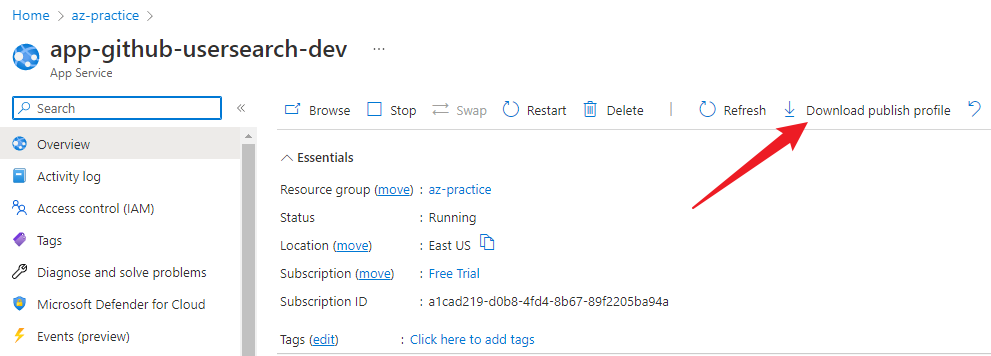
Get these two variables and put them into GitHub Secrets:
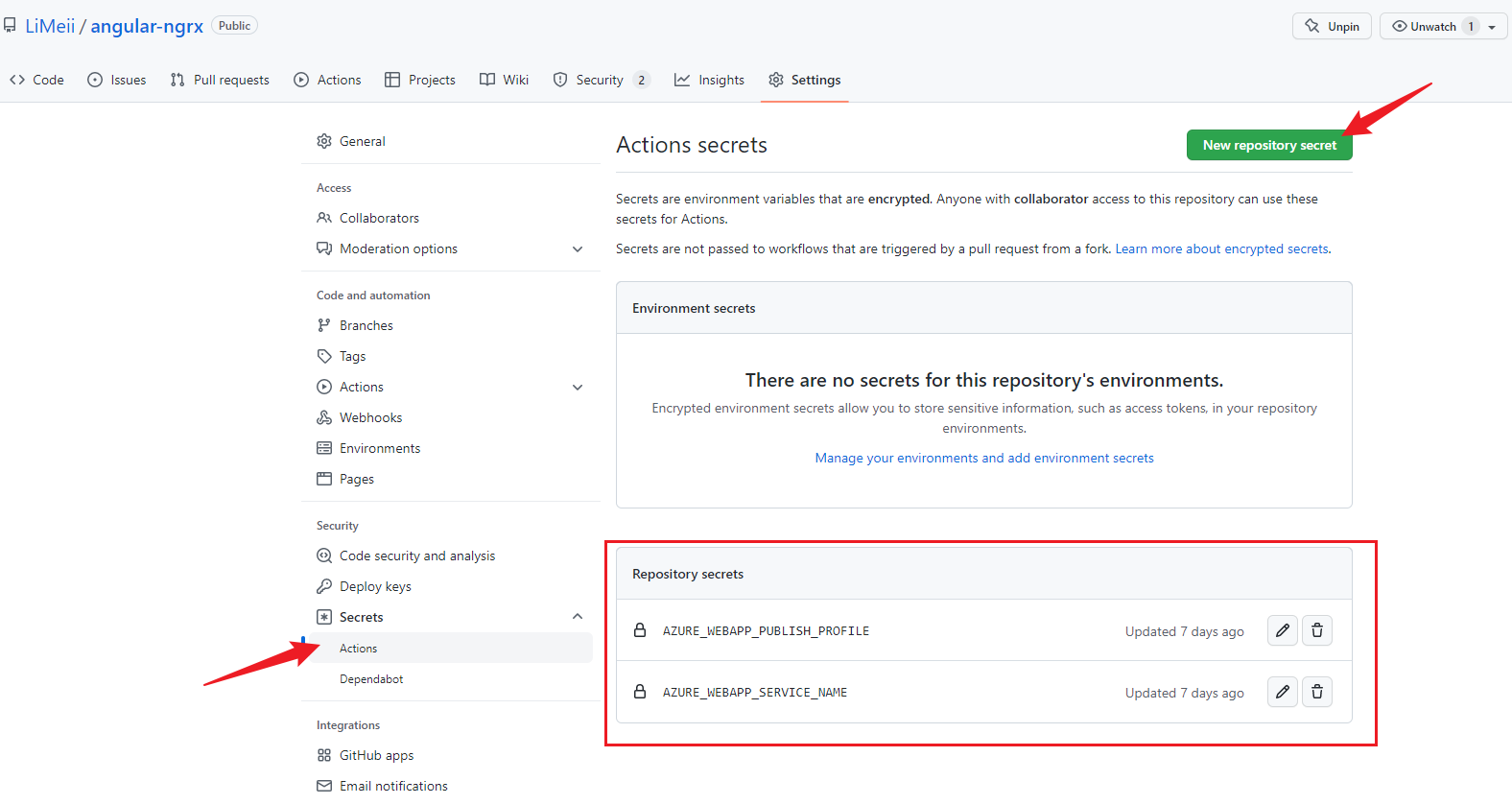
In the above yml file, I set trigger the workflow whenever code is pushed into master branch. For more workflow syntax can refer: 【Workflow syntax for GitHub Actions】
Now, checkin this yml file into master branch, and you can find the workflow under GitHub Actions:

Click into the workflow, you can see the two jobs: Build Deploy to Dev
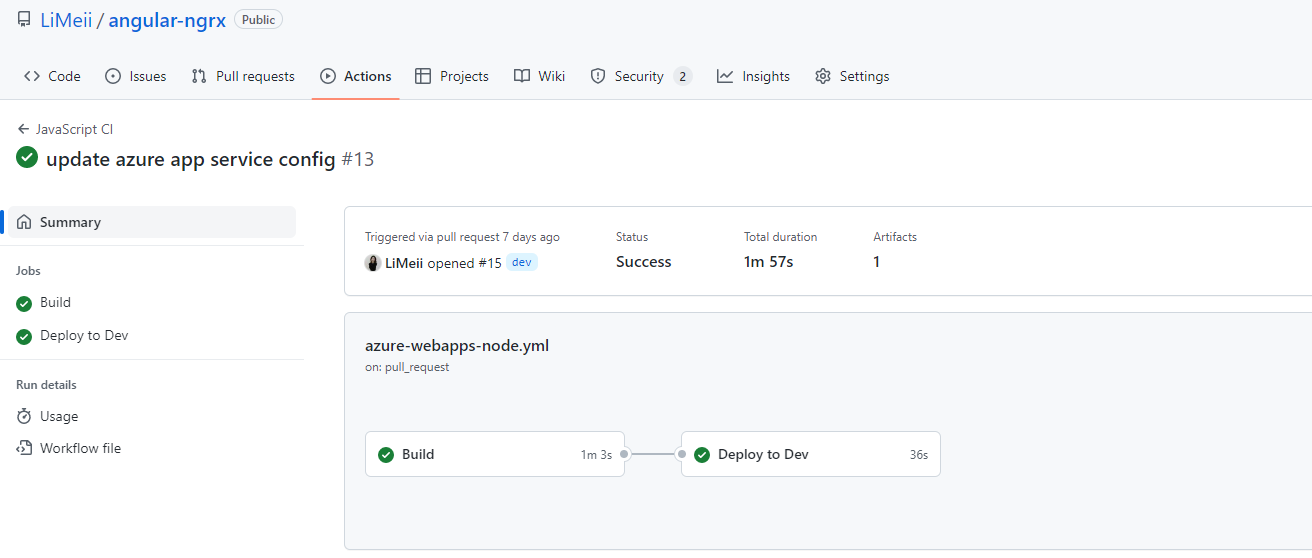
Click into the Job, you can see the detail steps:
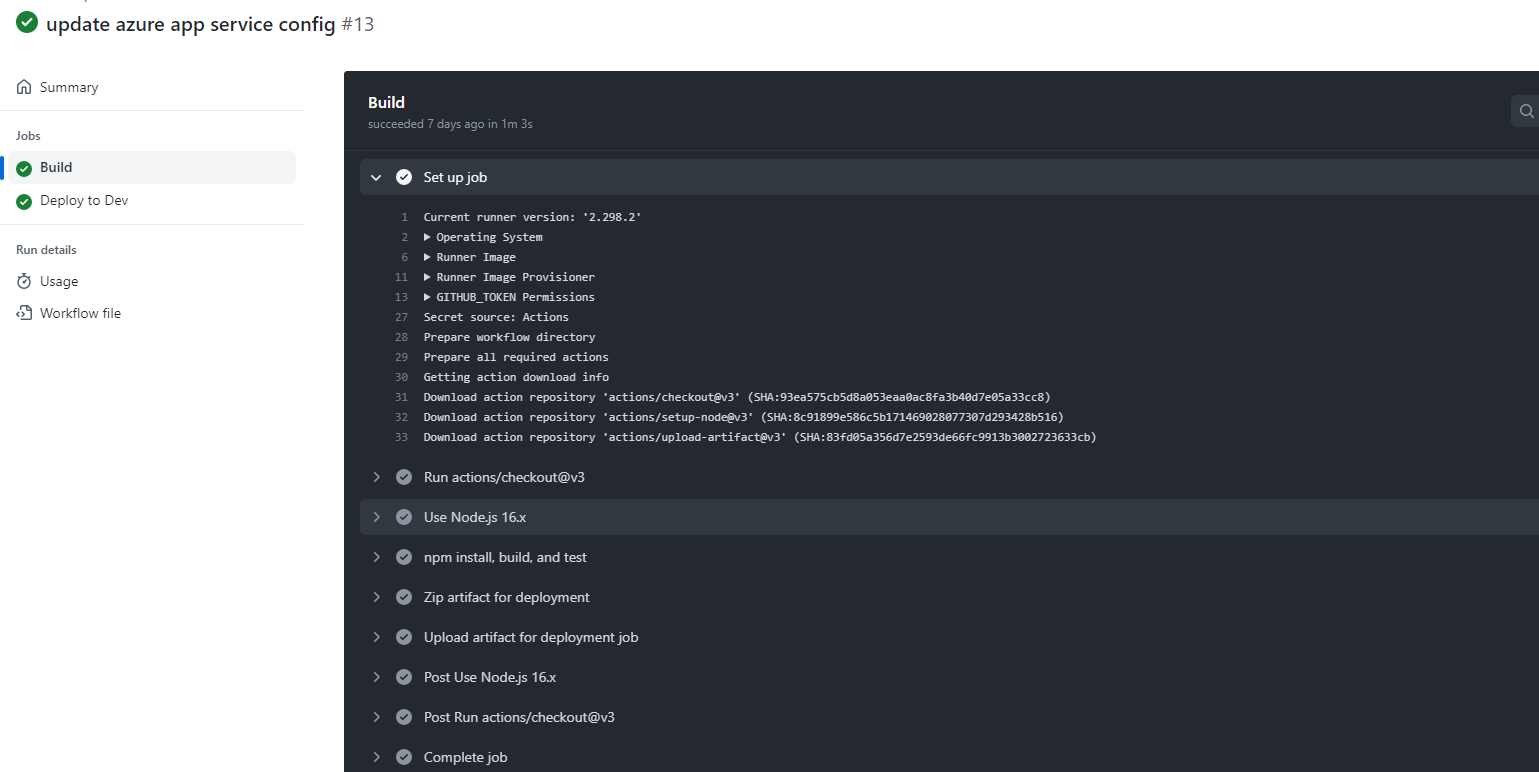
Go to Azure Portal, you can browser the web application from here:

You also can check the deployed bundle file from here:
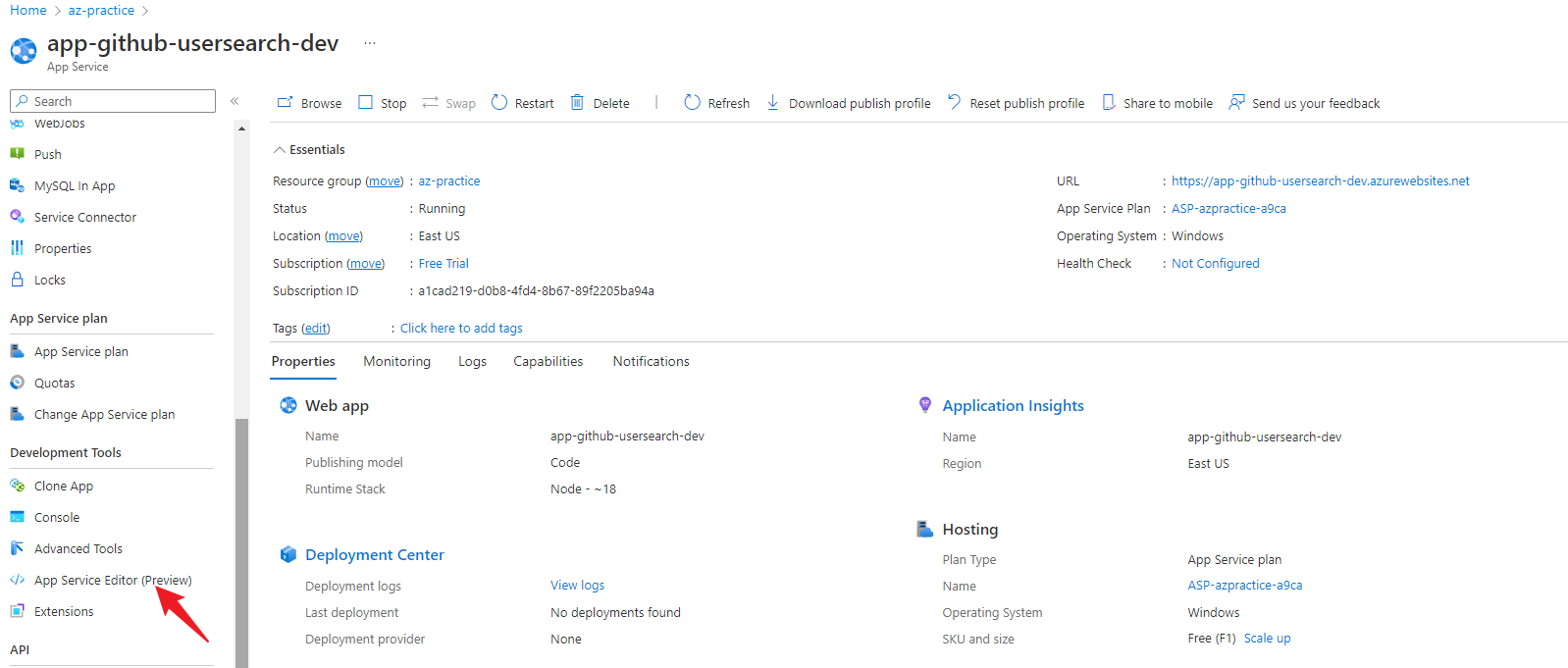
Click into App Service Editor (Preview):
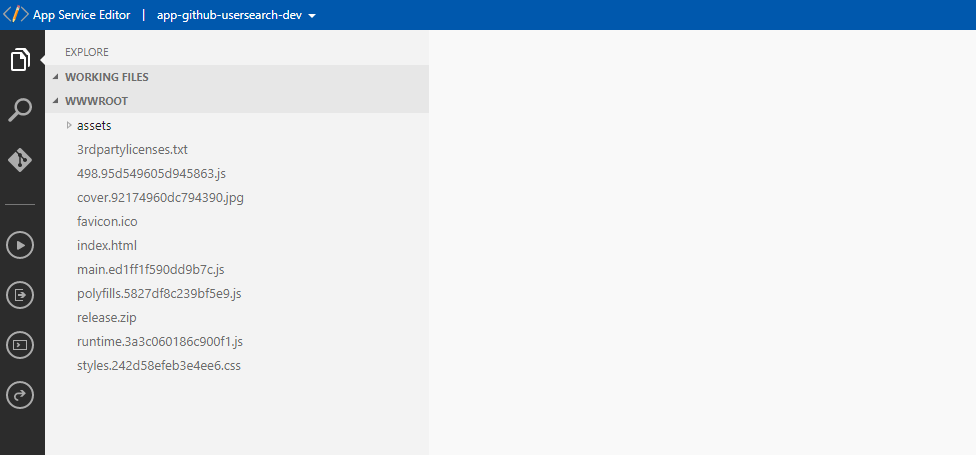
Manual trigger GitHub workflow with workflow_dispatch
By following the steps above, you can build a GitHub Actions workflow that automates process CI/CD whenever there is code pushed into the master branch. We also can manual trigger the workflow with workflow_dispatch
Click here to see YML file 👇
name: Build and deploy Angular app to an Azure Web App
on:
push:
branches:
- master
workflow_dispatch:
inputs:
logLevel:
description: 'Log level'
required: true
default: 'warning'
type: choice
options:
- info
- warning
- debug
tags:
description: 'Test scenario tags'
required: false
type: boolean
environment:
description: 'Environment to run tests against'
type: environment
required: true
env:
AZURE_WEBAPP_NAME: my-app-name # set this to your application's name
AZURE_WEBAPP_PACKAGE_PATH: '.' # set this to the path to your web app project, defaults to the repository root
NODE_VERSION: '16.x' # set this to the node version to use
jobs:
build:
name: Build
runs-on: ubuntu-latest
steps:
- uses: actions/checkout@v3
- name: Use Node.js ${ { env.NODE_VERSION } }
uses: actions/setup-node@v3
with:
node-version: ${ { env.NODE_VERSION } }
cache: "npm"
cache-dependency-path: package-lock.json
- name: npm install, build, and test
run: |
npm install
npm run build --if-present
- name: Zip artifact for deployment
run: |
cd dist
zip release.zip ./* -r
- name: Upload artifact for deployment job
uses: actions/upload-artifact@v3
with:
name: node-app
path: ./dist/release.zip
deployDev:
name: Deploy to Dev
permissions:
contents: none
runs-on: ubuntu-latest
needs: build
environment:
name: "Development"
url: ${ { steps.deploy-to-webapp.outputs.webapp-url } }
steps:
- name: Download artifact from build job
uses: actions/download-artifact@v3
with:
name: node-app
- name: unzip artifact for deployment
run: unzip release.zip
- name: "Deploy to Azure WebApp"
id: deploy-to-webapp
uses: azure/webapps-deploy@v2
with:
app-name: ${ { secrets.AZURE_WEBAPP_SERVICE_NAME } }
slot-name: "production"
publish-profile: $ { { secrets.AZURE_WEBAPP_PUBLISH_PROFILE } }
package: ${ { env.AZURE_WEBAPP_PACKAGE_PATH } }
Checkin this change into master, and you can see the Manual trigger button:
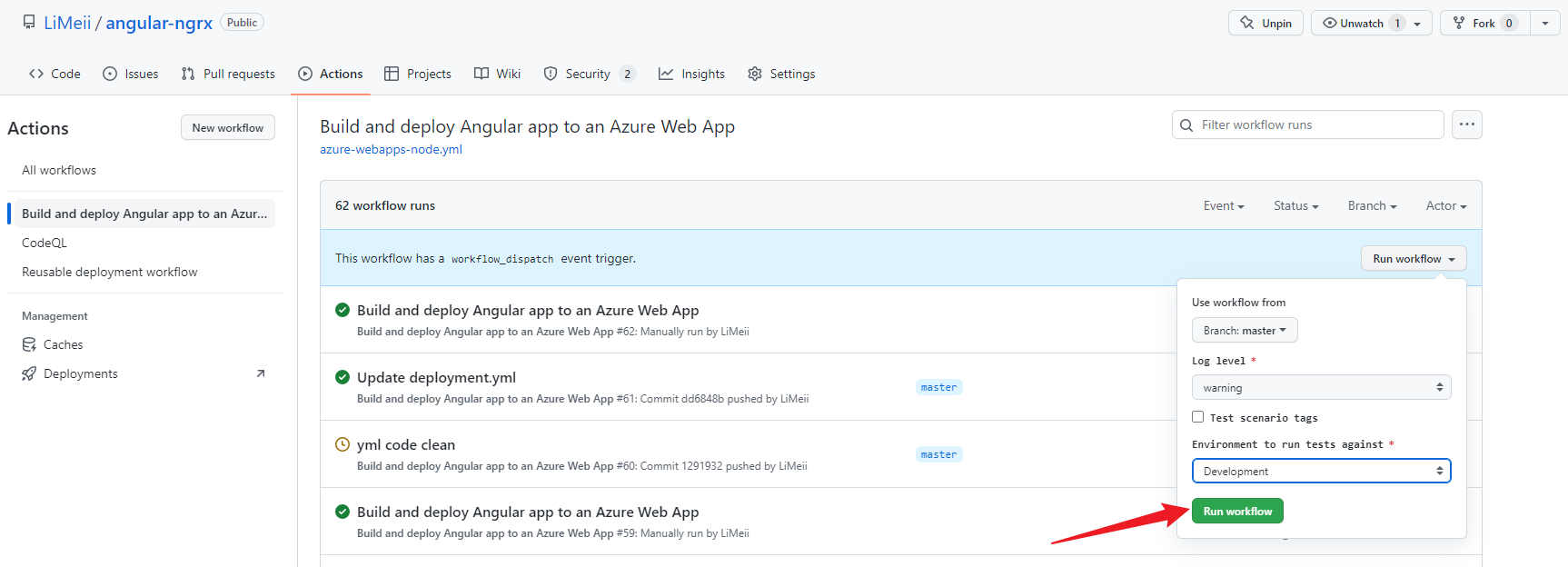
Click Run workflow button, a workflow will run:
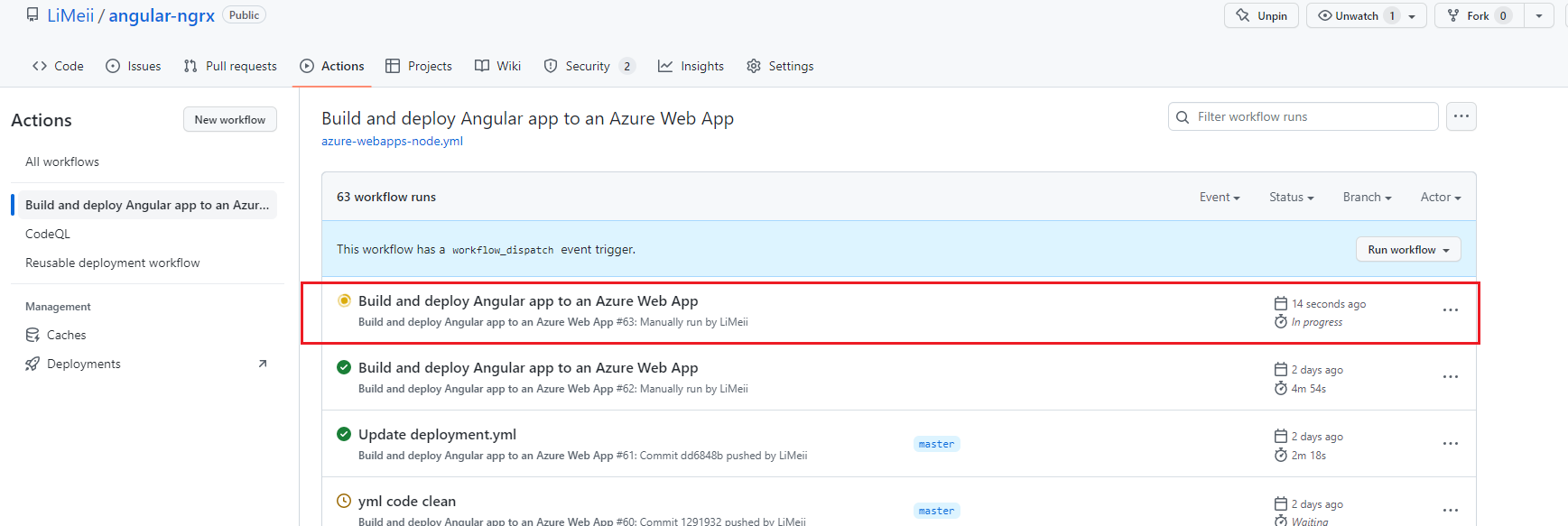
In real projects, we usually need to deploy on multiple environments , eg: Dev Staging and Production. How can we accomplish this? Find more details in my next article: 【Deploy on multiple environment with GitHub Actions】